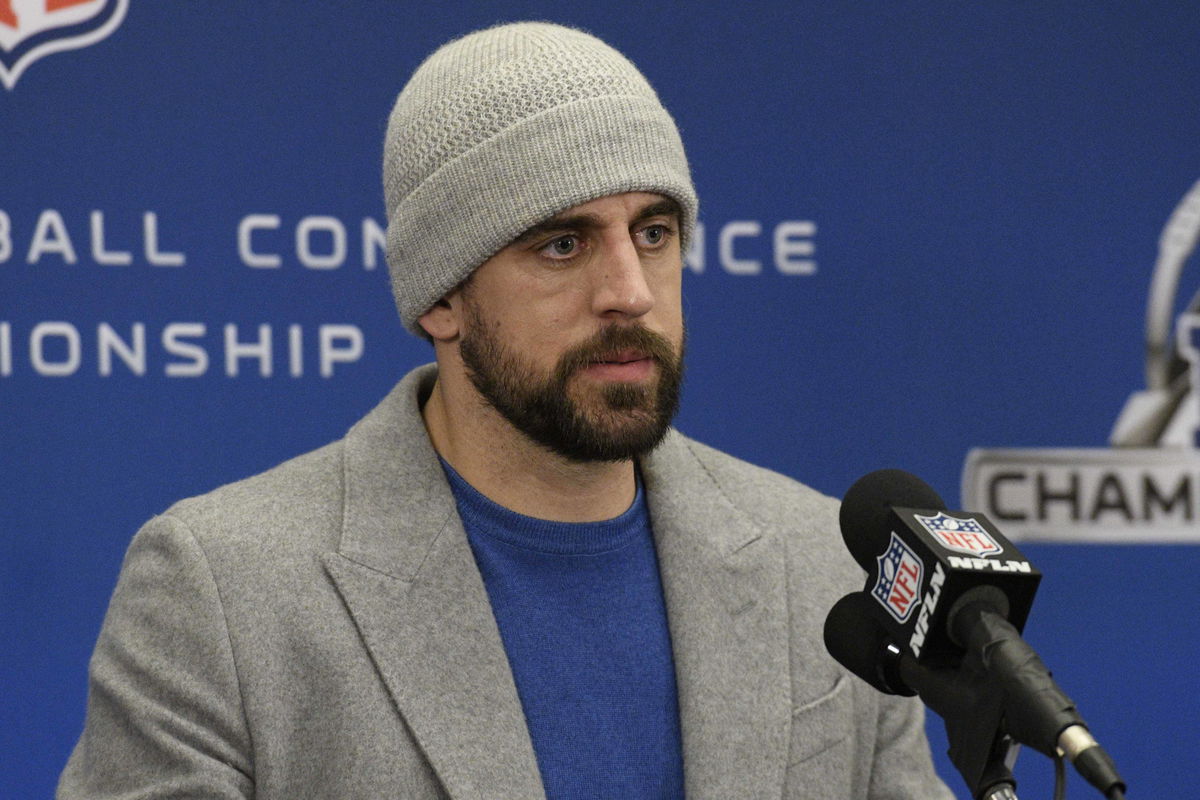
USA Today via Reuters
NFL, American Football Herren, USA NFC Championship-Green Bay Packers at Atlanta Falcons, Jan 22, 2017 Atlanta, GA, USA Green Bay Packers quarterback Aaron Rodgers 12 speaks to media after the game against the Atlanta Falcons in the 2017 NFC Championship Game at the Georgia Dome. Atlanta defeated Green Bay 44-21. Mandatory Credit: Dale Zanine-USA TODAY Sports, 22.01.2017 19:03:15, 9832484, NPStrans, Georgia Dome, NFL, Atlanta Falcons, Green Bay Packers, Aaron Rodgers PUBLICATIONxINxGERxSUIxAUTxONLY Copyright: xDalexZaninex 9832484

USA Today via Reuters
NFL, American Football Herren, USA NFC Championship-Green Bay Packers at Atlanta Falcons, Jan 22, 2017 Atlanta, GA, USA Green Bay Packers quarterback Aaron Rodgers 12 speaks to media after the game against the Atlanta Falcons in the 2017 NFC Championship Game at the Georgia Dome. Atlanta defeated Green Bay 44-21. Mandatory Credit: Dale Zanine-USA TODAY Sports, 22.01.2017 19:03:15, 9832484, NPStrans, Georgia Dome, NFL, Atlanta Falcons, Green Bay Packers, Aaron Rodgers PUBLICATIONxINxGERxSUIxAUTxONLY Copyright: xDalexZaninex 9832484
Aaron Rodg͏ers wasn’t playing games when he made his intentions crystal clear back in April. The four-time MVP went on The Pat McAfee Show and laid it all out: “It ain’t about the money. I’ll play for $10 million. I don’t care. I never once said I needed a multi-year deal.” Those weren’t just throwaway comments for the cameras—Rodgers meant every word. And two months later, he proved it by putting pen to paper with the P͏i͏ttsburgh Steelers.
Watch What’s Trending Now!
The final numbers tell the story of a quarterback who walked his talk. Rodgers signed a one-year deal worth $13.65 million. Albert Breer just dropped the full breakdown of what Rodgers actually signed up for in Pittsburgh, and the numbers paint a clearer picture of this supposedly team-friendly deal.
ADVERTISEMENT
The one-year contract carries a $13.65 million base salary, with $10 million locked in as guaranteed money—so Rodgers has that financial security no matter what happens. But the real kicker is in the incentive structure, which could potentially add another $5.85 million to Rodgers’s earnings if everything goes right.
There’s one major catch, though: Rodgers has to be on the field for at least 70% of Pittsburgh’s regular-season snaps to even sniff those bonus dollars. If he stays healthy and hits all his marks, this “discount” deal suddenly becomes worth $19.5 million—not exactly pocket change, but still a far cry from what a quarterback of his caliber could command on the open market.
ADVERTISEMENT
Breaking down Aaron Rodgers’ playoff ͏money trail
The incentive structure in Aaron Rodgers’ Pittsburgh deal reads like a roadmap to championship glory, with each step worth progressively more cash. Getting the Steelers into the playoffs triggers a $500,000 bonus—nice pocket change for essentially doing the job he was hired to do. But things get interesting from there.
ADVERTISEMENT
If Rodgers earns a first-round bye or wins a wild-card game while playing at least half the snaps, he’s suddenly looking at an additional $600,000. T͏he pl͏ayof͏f bonuses start modestl͏y and scale͏ up q͏u͏ic͏kly, creating a͏ financi͏al͏ ladder ͏t͏ha͏t m͏irrors e͏xactly what P͏ittsburgh hopes͏ t͏o climb͏ this seas͏o͏n.
Aaron Rodgers’ #Steelers Contract
▪️1 year, $13.65M base
▪️$10M signing bonus
▪️$14.15M cap hit
▪️$5.85M Incentive Package
– Playoff Berth: $500k
– Wild Card Win: $600k
– Divisional Win: $750k
– Conf. Champ: $1M
– Super Bowl Win: $1.5M
– League MVP: $1.5M— Spotrac (@spotrac) June 10, 2025
ADVERTISEMENT
Win a divisional round matchup with meaningful playing time? That’s another $750,000 in the bank. Take the Steelers to an AFC Championship victory while staying on the field for at least 50% of the action, and we’re talking about a $1 million payday. But the crown jewel sits at the very top—a Super Bowl win with Rodgers playing significant snaps nets him $1.5 million. Add another $1.5 million if he somehow captures MVP honors at 41 years old, and you’ve got $3 million tied to achievements that would cement his legacy forever.
The real͏ity check on͏ maximum earnings
ADVERTISEMENT
The math on Aaron Rodgers’ deal tells you everything about Pittsburgh’s realistic expectations. Getting him to an AFC Championship while hitting the required playing-time thresholds represents the most achievable ceiling, adding $1.85 million to his base salary through cumulative bonuses. That scenario puts his total earnings around $15.5 million—still well below the market rate for a quarterback of his pedigree.
The full contract value of $19.5 million only comes into play if everything goes perfectly: a playoff berth, a deep postseason run, and either a Super Bowl win or an MVP trophy. If the Steelers end up paying every penny of those incentives, no one in the organization will be complaining—they’ll be too busy planning that championship parade.
ADVERTISEMENT
ADVERTISEMENT
ADVERTISEMENT
ADVERTISEMENT
.png)
.png)
.png)



